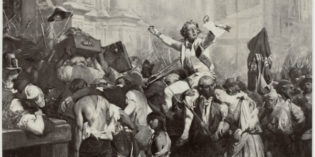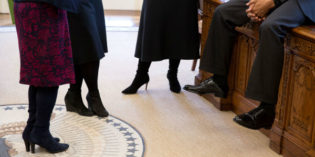Extending human and civic rights

Throughout history, only violent and catastrophic events have significantly cut inequality
Are mass violence and catastrophes the only forces that can seriously decrease economic inequality? To judge by thousands of years of history, the answer is yes, argues Walter Scheidel in this extract from his new book, The Great Leveller: Violence and the History of Inequality from the Stone Age to the 21st Century. Over thousands […]

What the ECJ’s ruling on headscarves means (and why it may be tough to enforce)
The European Court of Justice’s ruling this week does not ban employees from wearing headscarves at work, contrary to some media coverage. Rather, it allows bosses to ban them – along with other symbols of religious belief – if the job is customer-facing and the workplace has a neutrality policy. Steve Peers predicts that such bans may […]

Never mind NICs: gender budgeting reveals the Spring Budget’s true impact on poorer women
Last week’s Spring Budget failed to reverse a series of cuts that effectively take away money from poorer women and give it to better-off men. The Treasury has a duty to pay due regard to the impact of its policies on women, but it is not doing so. Mary-Ann Stephenson and her colleagues at the […]

Geert Wilders isn’t turning people against immigration – he attracts those who already opposed it
The key story in the 2017 Dutch election campaign so far has been the high levels of support for Geert Wilders’ PVV in opinion polls. But what explains the PVV’s ability to attract voters? James Dennison, Andrew Geddes and Teresa Talò argue that although Wilders’ success is frequently linked to hardening views on immigration, attitudes toward immigration […]

When inmates make the rules (and enforce them): democracy in self-governing prisons
What happens when a state fails to run its prisons? David Skarbek and Courtney Michaluk examine the phenomenon of prison self-governance – when inmates are locked up but left to their own devices. In some jails in Latin America, prisoners establish their own governing bodies to keep order, sometimes even setting up extralegal courts of their […]

Audit 2017: How effectively is the representation of minorities achieved in UK public and political life?
As part of our 2017 Audit of UK democracy, Sonali Campion and Ros Taylor examine the extent to which the representation of minorities in the UK operates to foster or to damage democratic public life. Where previous historical inequalities and discrimination against ethnic minorities are being rectified, is the pace of recent change fast enough? Are there areas where […]

Book review: The French Revolution: From Enlightenment to Tyranny, by Ian Davidson
In The French Revolution: From Enlightenment to Tyranny, Ian Davidson offers a new examination of the diverse factors that converged to spark and propel this crucial historical event. While the breadth of the book is occasionally overwhelming and characterised more by description than explanation, its rich detail highlights the intricacies of the French Revolution, finds Roberto […]

Britain’s ‘Christian right’: seeking solace in a narrative of discrimination
The ‘Christian right’ in the UK may not be anywhere near as powerful as its US counterpart, but it still tries to exert influence on public policy. This has become increasingly difficult as fewer Britons identify themselves as Christian. Steven Kettell finds that although these campaigners bemoan the effects of secularisation, they have found themselves adopting secular arguments in order […]

Female cabinet picks: just one more way in which Trump is exceptional
Donald Trump’s cabinet is exceptional in many ways, not least because the share of women in the executive has fallen since the Obama era – even as recent decades have seen it grow all over the world. What effect does government ideology have on cabinet picks? The literature suggests left-wing governments tend to appoint more […]



 Democratic Audit's core funding is provided by the Joseph Rowntree Charitable Trust. Additional funding is provided by the London School of Economics.
Democratic Audit's core funding is provided by the Joseph Rowntree Charitable Trust. Additional funding is provided by the London School of Economics.